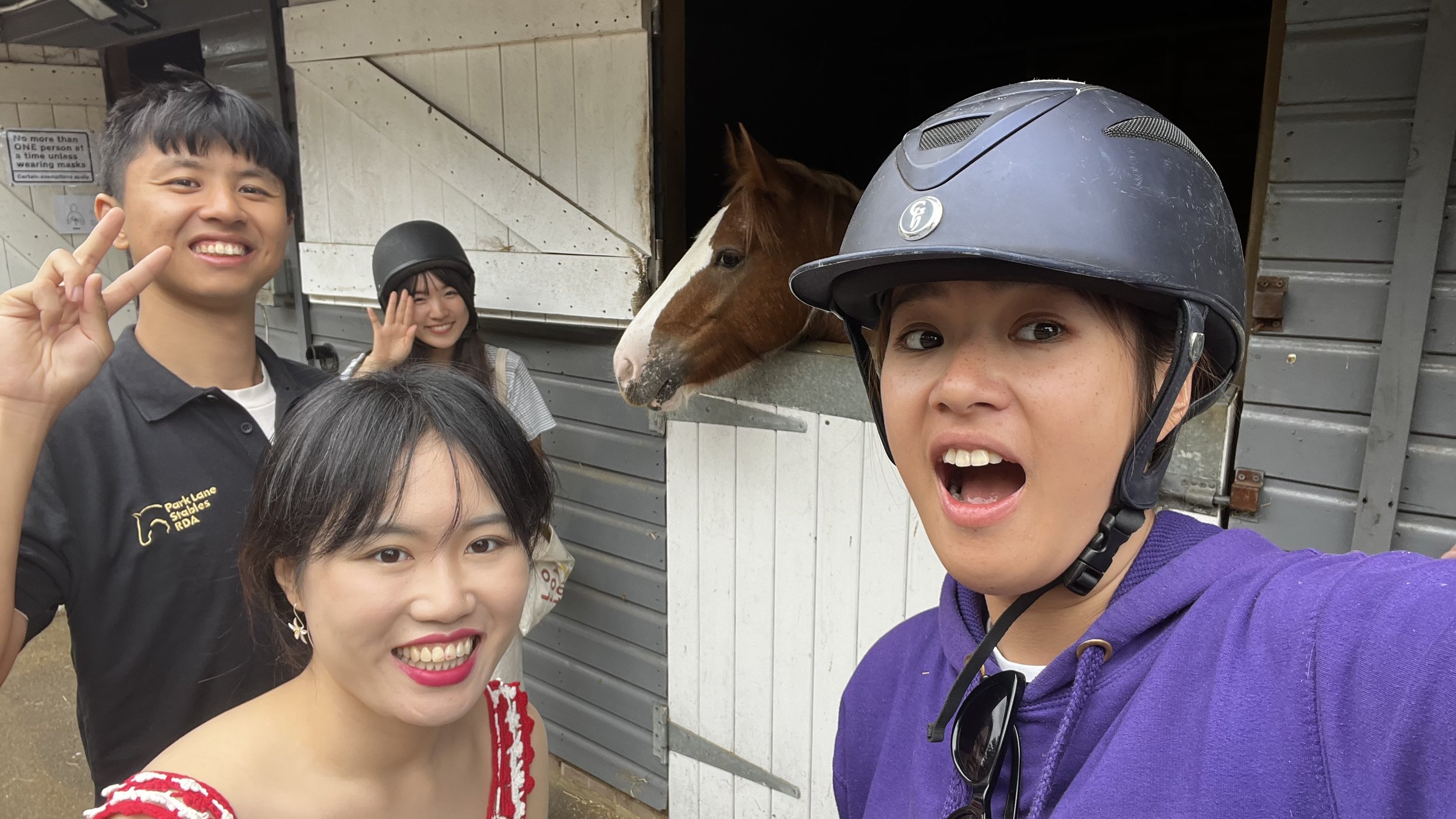What did Shirley and Thomas from China, and Jihee from South Korea, make of Park Lane Stables?
Shirley, Thomas and Jihee were all students of Sports Industry Management at Loughborough University when they met Natalie who had been invited to give a talk about the work of Park Lane Stables. They were so inspired by what they heard that they asked if they could visit Park Lane to see that work in action.
This is their account of the lasting impressions they took away from that day. All of them left thinking ‘how could we introduce something like this back home?’
“The horses at Park Lane Stables are treated like friends” – Jihee from South Korea
Natalie and the team welcomed us warmly when we arrived at Park Lane Stables. There was a really good atmosphere.
The most interesting but also surprising thing for me was the way that the horses were treated like their friends. In my own horse-riding activities in South Korea, the horses were there to entertain people. But at Park Lane Stables, the team waited for horses to be ready to interact rather than forcing them to serve the people. I also realised that the stables I had visited before were very exclusive. The activities and equipment was only suitable for visitors who were not disabled.
The special equipment used at Park Lane meant everybody could be included in activities regardless of any physical or mental impairments. I felt a strong desire to implement this approach to stables in South Korea. Seeing Park Lane Stables for myself was so inspiring.
“Riding horses for therapy is actually true!” – Shirley from China
I had no idea what a charitable stable really was before I came. But everyone was natural and friendly. A generous concept attracts like-minded generous people. Everyone at Park Lane Stables was so kind, to both humans and horses.
Peter really understood how a horse’s body works, and gave us a thorough introduction patiently. Youth volunteers also made a deep impression – they worked for passion and happiness, not for money. All the horses seemed relaxed, happy and safe to be around.
Your belief that riding horses is therapy was amazing. It’s actually true! When we were riding, we felt we communicated with the horses, and they comforted us in a non-verbal but intimate way. We could feel that the horses understood our words and felt our emotions. We could also appreciate the beautiful natural scenery when we were in the saddle. It was a different angle to discover the world.
I really want to bring this concept to China. I believe if people could see this for themselves they would understand its value. But it would be hard to run a charitable stables like this when we don’t have anything like it.
“Natalie’s story really gave me strength” – Thomas from China
Natalie’s story is very inspiring and I still remember her sharing her story in our Loughborough class vividly. When she talked about her values and dreams, I could see light shining in her eyes and feel her energy.
The idea of ‘riding for all’ was really new to me because I believed the stereotype that riding is for rich people. It made me respect Natalie a lot. The story of a little girl in Birmingham who succeeded in pursuing her dream really gave me strength. Most of our parents in China, like Natalie’s parents, want us to grow up to be doctors, lawyers, and teachers. So, this heroic story of pursuing a childhood dream is inspiring and empowering. And especially after we went to the stables, we saw how they provide help to vulnerable children, and how gently they treat the ponies. The Park Lane Stables’ team’s commitment and dedication to this great work really touched us.
When I ride, I feel a sense of confidence inside my body. Carriage driving was one of the best experiences I’ve ever had. The view from the carriage is completely different, giving you a new perspective on the world around you.
Since we don’t have urban stables in China, it might be impossible to have children experience horse riding, not to say disabled children, which is a shame. In China, many vulnerable groups are still excluded from society and their voices are not heard by the majority. So, I think we could convey the message to parents and people that everyone deserves care and support both physically and mentally.
Natalie’s work and her story are great examples, and they deserve to be heard by as many people as possible.
Thank you to Jihee, Shirley and Thomas. We hope you’ll keep in contact with us and let us know if you succeed in bringing some of the Park Lane ethos to stables in South Korea and China

